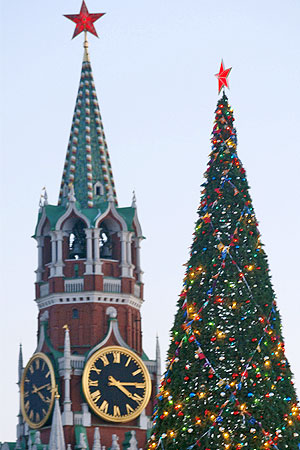
Contrary to the western European Countries and Americas that finish celebrating winter holidays on January 1st, eastern European countries that follow the Russian Orthodox Church only commence their celebrations on January 1st. Culmination of the festivities is the Russian New Year on January 13th, dubbed the Old Russian New Year. Curiously, most Jews from former Soviet Union partake in most these holidays’ feasts and customs in earnest.
First, a bit of explanation of the background of the holidays as was celebrated in the Soviet Union and by the Orthodox Church. USSR, an atheist state has tried to eradicate religion wherever it was found, from Christianity to Judaism. None of the religious holidays were celebrated officially and even private celebrations of them were frowned upon. However, New Year’s was a huge holiday celebrated by all, with none of the religious connotations. Almost all state holidays centered around some kind of Communist victory or ideal, e.g. Red Revolution Day or May 1st day of Communist Laborers. Those holidays were forced upon the Soviet people and thus, celebrations were feigned by many. Only two state holidays were truly revered and wholeheartedly celebrated by all- May 9th Victory Day Over Nazi Germany and January 1st New Year Day.
In the Russian Orthodox Church traditions, Christmas is observed on January 6th. Moreover, New Year Day is marked as Circumcision of Christ on January 13th. Curiously, Russian Church celebrates the New Year fourteen days after the rest of the world because of its use of the Julian calendar, under which system the year ends two weeks later than the Gregorian calendar used by everyone else. The Russian Empire used the Julian calendar until it was replaced with the Gregorian one by the Communists in 1918 to conform Soviet Union’s calendar to the rest of the world’s. However, the Church retained the old tradition of using the Julian calendar for its observance of the religious holidays.
Where do the Jews who are emigrants from former USSR countries fit in this wintry mix of holidays? Not surprisingly, majority of Russian-speaking Jews are secular due to their upbringing in Soviet Union that was devoid of religion, especially of Judaism. Although, Soviets made January 1st New Year Day a completely secular holiday, some old traditions of the New Year Day were kept in a modified form. Christmas Trees were joyously installed in every home and adorned with a Red Star on top. St. Nicholas came dutifully to every home albeit under a new, sanitized name, Grandfather Frost. He even had a sidekick, his cute granddaughter, the Snow Maiden. Jews imitated all of these New Year’s practices together with their gentile brethren, blissfully uncaring for their Christian origins. Same holds true to this day in new homelands of the Russian-speaking Jews. As their American Jewish friends refrain from putting Christmas Trees in their homes, they are bewildered to see most Russian-speaking Jews continue this tradition. Moreover, for many, this custom brings sweet nostalgia for the good times in Motherland while smell of fresh fir tree brings a whiff of one’s innocent Soviet youth.
In Russia, New Year’s Day is still a incredibly celebrated day. Recently, Jawbone, a fitness tracker company, termed New Year Eve as a “Superholiday” in Russia since according to its study, Russians go to sleep the latest in the world on that night, presumably caught up in the revelries to the wee hours. Russian-speaking Jews worldwide are on par in their festivities, even in Israel – a country that Jawbone describes as one of two where residents go to sleep earliest on New Year Day.
A new marvel is the widespread celebration of Russian New Year, oxymoronically called the Old New Year. In the Soviet Union, this Holiday was unheard of unless one worshipped in Church, which was very rare for Homo Soveticus. In the new Russia that is returning to its old Russian Orthodox roots, the Holiday is observed in Churches and at parties. For Russians, Old New Year is the last time to have a bash before the return of the whole country to the normal working schedule following a winter break.
As a Russian-American immigrant, I became more attuned to the festivities of the Old New Year when my family bought a Russian themed cabaret in New York. We were astounded how quickly, year after year, the restaurant filled up with patrons to dance the night away in the alcohol infused marking of the Holiday. We realized that Russian speakers came for a get-together with friends and families to celebrate beginning of the New Year at a convenient time when everyone was back from winter vacations. After all, as age-old adage states “There is nothing wrong with two Jews celebrating the circumcision of another Jew”.
By: Michael Levitis
